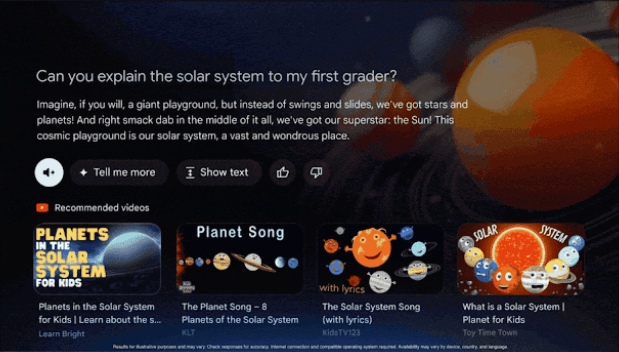
Google this week let us know about a number of new features we can expect to see in the upcoming Android 16 TV release later this year. The software will power the Google TV operating system that’s found on high-end models from companies such as Sony, TCL and Hisense.
The new features include a new surround sound format in Eclipsa Audio, and the launch of Gemini for TV, which replaces the old Google Assistant.
At Google I/O 2025, the company proudly boasted that Google TV and Android TV now have a combined 270 million monthly active devices, making it one of the world’s most dominant television operating system platforms. Google TV is essentially an enhanced version of Android TV, with a more streamlined user interface and a few other gimmicks, but they’re essentially the same software.
The updates in Android TV 16 are relatively minor because Google delivers a lot of new functionality via the cloud, so it doesn’t have to worry about refreshing the underlying Android platform.
With Eclipsa Audio, Android and Google TV devices are getting a new surround sound format to rival Dolby Atmos and DTS:X. Developed in partnership with Samsung Electronics, Eclipsa Audio is an open-format that’s said to be “channel-based”, as opposed to the object-based Dolby Atmos standard. According to Google, Eclipsa supports first- and third-order “ambisonics” that make it possible to generate a 3D audio soundscape. It can handle as many as 28 input channels, which are rendered to whatever output speakers or headphones are being used.
The first Eclipsa Audio compatible content will be found on YouTube, Google has said, but it’s also hoping to get other content platforms on board.
A few developer-focused updates include the MediaQualityManager framework, which gives streaming apps the ability to change the TV’s hardware, audio and picture settings to make life easier for viewers. Essentially, it enables a service like Netflix to switch your TV to a special picture setting such as Filmmaker Mode automatically, without the viewer having to do anything.
There’s also a new Jetpack Compose feature, previously available in beta, which makes it possible to create apps using a new design language built especially for Google TV.
For users, the most visible change will likely be the appearance of Google’s generative AI assistant Gemini in place of the old Google Assistant, which is being retired. It’s set to launch on Google TVs in the autumn, but Google didn’t say if this will require a firmware upgrade or come baked into the first Android TV 16 update. Gemini for TVs will be able to do much more than Google Assistant. For instance, Google said you’ll be able to tell it that you enjoy watching Jurassic Park, and would like to know if there’s anything similar to that available on the various services you subscribe to. It will then quickly pull up a list of recommendations.

Alternatively, you might ask Gemini to explain the solar system to your six-year old child, and it will bring up a choice of videos from YouTube and other sources.
Google hasn’t yet offered any official launch date for Android TV 16, or said when the updated Google TV platform based on the new software will launch. Most likely, we’ll see it on the Google TV Streamer first of all, with third-party brands set to get it later on.